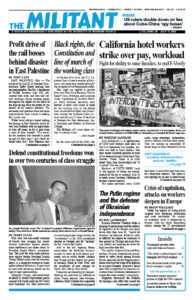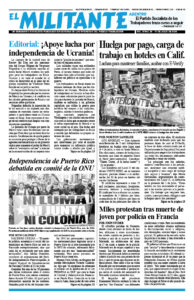Under the impact of rising prices coupled with declining production and trade worldwide, the capitalist economic crisis is deepening in Europe. And this feeds sharpening strains among the 27 governments that comprise the European Union as well as competition with Washington, Beijing and other capitalist powers for markets, raw materials and political sway.
The EU has already faced two consecutive quarters of economic contraction — the capitalists’ definition of a recession. And the German rulers reported June 26 deteriorating economic conditions.
The establishment of the EU, and creation of the euro as a common currency, used today by 20 EU members — strengthened the ability of the rulers of Germany and France to use their larger and stronger economic clout to squeeze rivals in eastern and southern European nations, which are marked by a lower level of industrial and economic development. The capitalist rulers try to offload the effects onto the backs of working people.
The rulers in Greece, Italy and Spain, who face mounting government debts, are among the countries where the working class has been hit the hardest, with increasing joblessness and cuts in social spending. In Spain, the unemployment rate rose to 13.2% in the first quarter of this year. In Italy, 20.4% of youth between 15 and 24 years old who wanted a job couldn’t get one, Rome reported in April.
But the crisis impacts the working class in both France and Germany as well. Food prices jumped by more than 14% over the past year in France. In Germany, official inflation figures rose to 6.8% in June. Industrial production there is declining and remains some 5% below pre-pandemic levels. This affects the entire eurozone economy.
Bosses and government spokespeople everywhere claim the biggest problem with inflation is it impels workers to fight for higher wages to try and catch up, leading to what they call a “wage-price spiral.” But this is false. Wage increases shift the percentage of the wealth workers produce to the advantage of the toilers, chipping away at the bosses’ profits.
One poster being used by UPS workers in the contract battle today makes this point, saying: “UPS ‘record profits’ are just unpaid wages.”
Central banks jack up interest rates
In an attempt to rein in inflation, the European Central Bank raised the interest rate to its highest level since 2001 on June 13. This was the bank’s eighth consecutive raise, putting the rate today at 3.5%. Raising rates is the favorite tool used by capitalist economists to try and cool down the economy and drive prices down. Targeting the working class they aim to slow production, increasing layoffs and competition among workers for jobs. And they cut wages in hopes of boosting production.
But as they admit, this can lead to an uncontrolled consequence. Already, rising rates drive up debts workers face on credit cards, auto loans, rents and mortgages, and more.
In response to rapidly rising consumer prices, officials from the Bank for International Settlements, the so-called central bankers’ bank, said, “governments around the world should raise taxes or cut public spending.” This is another way bosses and their governments seek to shift the burden onto workers’ backs — imposing greater “sacrifices” on working people through job cuts and reduced social benefits.
“The Global Economy Looks Like It’s Out of Sync,” is how the Wall Street Journal described today’s capitalist world picture June 16. “In just 24 hours this past week the central banks of the world’s three biggest economic blocs came to starkly different conclusions,” the article said, “with the eurozone raising rates, the U.S. on hold and the Chinese cutting.” But this isn’t “out of sync,” it’s the workings of the dog-eat-dog capitalist system, where each ruling class looks out for number one.
The Journal complains this makes it “harder for the Federal Reserve to put a lid on inflation.”
Despite these conflicts and intensifying competition for profits on the world market, “the rival national ruling classes are chained together in their decline,” explained a 1988 Socialist Workers Party resolution, printed in New International no. 10. And there is no replacement for “U.S. economic weight, or the dollar as international reserve currency.”

